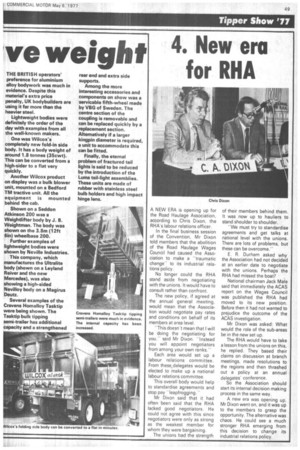4. New era for RHA
Page 79

If you've noticed an error in this article please click here to report it so we can fix it.
A NEW ERA is opening up for the Road Haulage Association, according to Chris Dixon, the RHA's labour relations officer.
In the final business session of the Convention, Mr Dixon told members that the abolition of the Road Haulage Wages Council had caused the Asso ciation to make a "traumatic change" to its industrial relations policy.
No longer could the RHA stand aside from negotiating with the unions. It would have to consult rather than confront.
The new policy, if agreed at the annual general meeting, would mean that the Association would negotiate pay rates and conditions on behalf of its members at area level.
"This doesn't mean that I will be doing the negotiating for you," said Mr Dixon. "Instead you will appoint negotiators from among your own ranks.''
Each area would set up a labour relations committee. From these, delegates would be elected to make up .a national labour relations committee.
This overall body would help to standardise agreements and stop pay "leapfrogging."
Mr Dixon said that it had often been said that the RHA lacked good negotiators. He could not agree with this since negotiators were only as strong as the weakest member for whom they were bargaining.
The unions had the strength of their members behind them. It was now up to hauliers to stand shoulder to shoulder.
"We must try to standardise agreements and get talks at
national level with the unions. There are lots of problems, but these can be overcome.
E. R. Durham asked why the Association had not decided at an earlier date to negotiate with the unions. Perhaps the RHA had missed the boat? _ National chairman Jack Male said that immediately the ACAS report on the Wages Council was published the RHA had moved to its new position.
Before then it had not wanted to prejudice the outcome of the ACAS investigation.
Mr Dixon was asked: What would the role of the sub-areas be in the new set up.
The RHA would have to take a lesson from the unions on this, he replied. They based their claims on discussion at branch meetings, made resolutions to the regions and then thrashed out a policy at an annual delegates' conference.
So the Association should start its internal decision making process in the same way.
A new era was opening up, Mr Dixon went on, and it was up to the members to grasp the opportunity. The alternative was chaos. He could see a much stronger RHA emerging from this decision to change its industrial relations policy.
























































































































